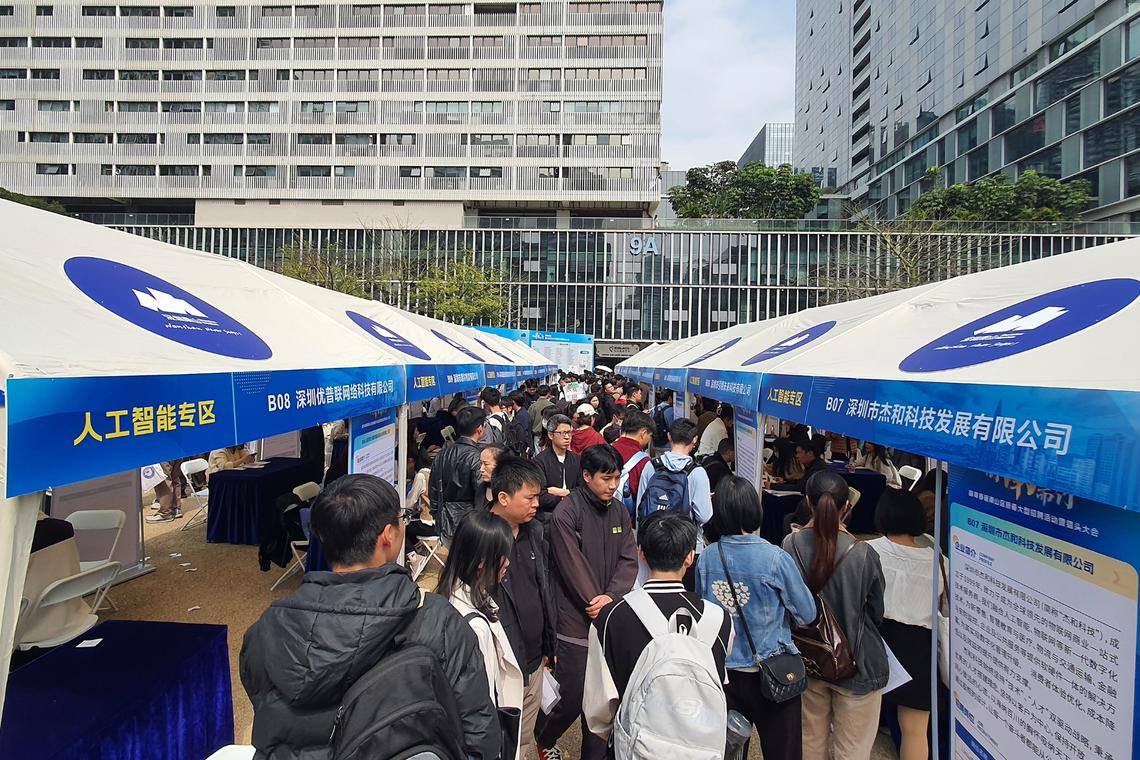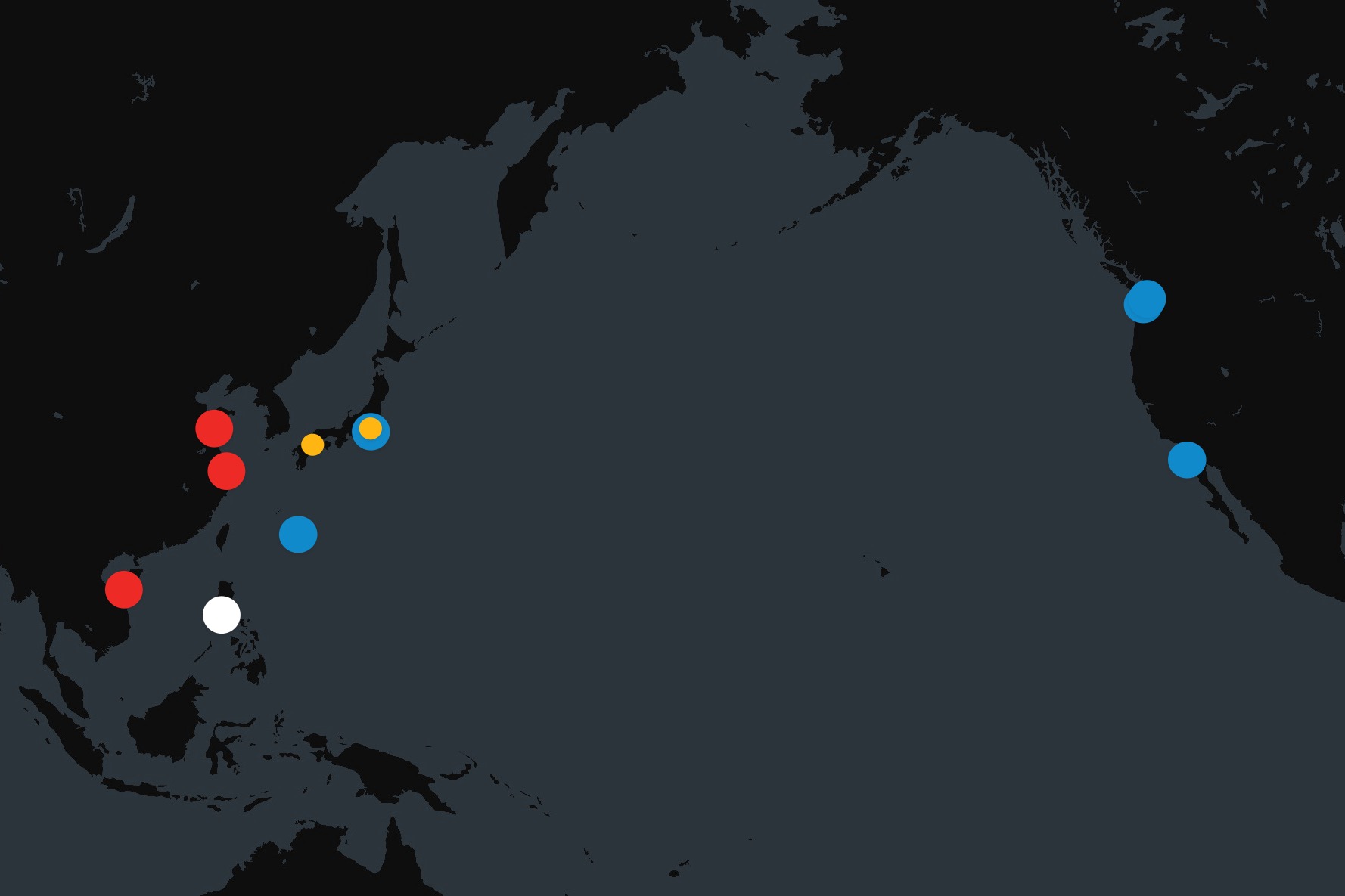BEIJING/SHENZHEN – Headhunter Jason Yang has been busy filling artificial intelligence (AI) jobs at top Chinese technology companies, from start-ups like DeepSeek to industry giants such as ByteDance.
Speaking to The Straits Times at a crowded jobs fair in the southern tech hub of Shenzhen this week, the recruiter said that he has had to cast a wide net, as the demand for AI talent in China far outstrips the number of people who qualify for these jobs.
To fill many of these positions, his company recruits top AI talent from overseas, including the US, Europe and Singapore, said the chief executive of Shenzhen-based headhunting company Touch HR.
These candidates are typically ethnic Chinese who have obtained bachelor’s and master’s degrees from China’s top universities and subsequently pursued doctoral studies in the US, Mr Yang said.
Headhunters like Mr Yang are finding it challenging to find suitable candidates as the battle for AI talent heats up in China, with Big Tech firms from Xiaomi to Alibaba shoring up their teams and more companies across different industries hopping on the AI bandwagon.
The shortage of skilled AI workers in China has led to some companies pouring out large sums of money to entice the existing talent – with some poaching from rival companies – and expanding their search to overseas talent, a move which analysts said might not be the most cost-effective owing to higher wage expectations.
This follows the global success of China’s newest AI darling DeepSeek, which has, in recent weeks, galvanised nearly the entire Chinese AI ecosystem to support the company and its models.
In January, DeepSeek stunned the global tech world with its open-source reasoning model and stoked panic over Chinese competition in AI, leading to a massive sell-off of US tech stocks.
Job applications for AI engineers rose 69.6 per cent in the first week after China’s spring recruitment season kicked off after Feb 4, according to weekly data released by Chinese recruitment platform Zhilian Zhaopin.
AI-related sectors such as the computer hardware industry also had more job openings, with high demand for technical talent such as engineers, the data released on Feb 17 showed.
With China’s booming AI industry creating a surge in AI-related job openings, analysts said, in line with industry data, that there is now a mismatch between AI talent demand and supply.
By 2030, China’s demand for AI professionals is expected to reach six million, but the domestic pool can provide only one-third of the necessary talent, leaving a shortage of about four million workers, according to a May 2023 report published by American consulting firm McKinsey.
An August 2024 report by the Renmin University’s School of Labour and Human Resources concluded that China’s AI talent market has a severe shortage, particularly of top-tier talent such as AI scientists and those with interdisciplinary expertise.
Associate Professor Zhang Chenggang at the Capital University of Economics and Business’ School of Labour Economics said the rise of large language models has encouraged more businesses to adopt AI for efficiency or to increase productivity but, at this initial stage, many are still figuring it out.
“Short-term talent gaps are inevitable as developing expertise takes time and often spans generations,” he said, noting that the contest for AI talent might become more intense as more firms better integrate AI into their operations.
Bringing in overseas talent could be a good option for a start, as the overall number of foreign hires remains relatively small, said Prof Zhang.
“But if China continues to develop as a leading AI hub and attract a large influx of overseas AI professionals, it could create a competitive environment for local talent,” he added.
Job seekers at an employment fair in Shenzhen on Feb 18.ST PHOTO: JOYCE ZK LIM
AI has emerged as a bright spot in China’s bleak domestic jobs market, where youth unemployment fell for a fourth straight month in December 2024 but still remains high.
At a jobs fair in Shenzhen on Feb 18, some employers in the AI field told ST there has been heightened interest in their job openings in 2025 amid a recent DeepSeek and robotics craze.
“We can clearly feel that we are receiving many more CVs (curriculum vitae),” said Ms Angela Hou, who works in human resources at UBTech Robotics.
The company is expanding recruitment for research on humanoid robots, she added.
Touch HR’s Mr Yang said demand for AI talent in China has been on the rise since American AI company OpenAI’s ChatGPT was released in late 2022.
That spurred many Chinese tech companies to race to catch up.
Even though Chinese universities are investing in training AI talent, Mr Yang noted that in order to do cutting-edge research and development, candidates typically need to have PhDs.
“The output (of AI-trained PhD holders) is relatively low, so everyone is vying for them,” he said.
Back in 2020, China’s Ministry of Human Resources and Social Security reported that the country faced a shortage of more than five million AI professionals, with only one qualified person for every 10 AI jobs.
It said then that strengthening talent development and addressing the talent shortfall were an “urgent priority”, cautioning that if China does not “scale up talent production”, the talent gap will exceed 10 million by 2025.
More than 500 Chinese universities and colleges have rolled out an AI major since 2018, a year after Beijing unveiled its plan to become the world leader in AI.
At present, one way in which Chinese tech companies compete for talent is with attractive salaries.
Mr Yang said those graduating with PhDs could command an annual salary of between 800,000 yuan (S$147,000) and one million yuan. The highest salary which he had seen offered to top talent was between 10 million yuan and 20 million yuan per year.
Since it burst onto the global stage, DeepSeek has embarked on an aggressive recruitment drive to attract top talent.
DeepSeek’s highest offer is a monthly salary of between 80,000 yuan and 110,000 yuan, which, coupled with the company’s 14-month pay system, could mean an annual income of up to 1.54 million yuan for deep learning researchers for artificial general intelligence, a Chinese media report stated on Feb 4.
The company currently has 150 employees and is looking to fill 52 new positions, such as deep machine learning researchers, researchers for core technologies and user interface designers, primarily in the coastal Hangzhou city where DeepSeek is based and in Beijing, said the report.
In comparison, the estimated average annual salary for an AI engineer in China is around 380,000 yuan, according to US-based jobs platform Glassdoor.
Tech companies with deep pockets have also taken to poaching talent from their competitors.
DeepSeek core researcher Luo Fuli, who was heralded by Chinese netizens as a “post-95 genius”, jumped ship to Xiaomi after reportedly being offered an annual salary in the tens of millions.
Alibaba recruited Singapore-based AI expert Steven Hoi from Salesforce Research Asia. Chinese tech-focused publication 36Kr on Feb 17 reported that ByteDance hired computer scientist Wu Yonghui, a 17-year Google veteran.
Australian National University’s associate professor of economics Kailing Shen said the growing belief in the financial viability of AI development is what is likely driving the rapid growth of AI-related jobs in China.
“However, in a competitive market, this could also drive down prices, potentially impacting profit margins. Like other major historical shifts, AI adoption will be a long and non-linear process,” she said.
Professor Zeng Xiangquan, director of the China Institute for Employment Research at Renmin University in Beijing, said that as China steps up its focus on AI, the talent gap may be resolved over time in five to 10 years.
Top Chinese universities such as Tsinghua University and Renmin University have already established AI schools and launched AI-focused curricula to expand the talent pool, said Prof Zeng, who is the former dean of the university’s School of Labour and Human Resources.
The real long-term challenges, he said, are accumulating enough data to train AI models and increasing computing power, which is a key driver of AI progress, at a time when US chip curbs are in place.
Back at the jobs fair in Shenzhen, 41-year-old Bob Liu was braving the crowds in search of an employer in the AI field.
He had previously headed the engineering department at an American manufacturer of server systems, but lost his job after the company left China amid the US chip curbs.
Server systems provide computing power for AI applications.
Mr Liu was optimistic about landing a new role. “I see that every company, no matter the industry, has some form of AI team.”
- Michelle Ng is China correspondent at The Straits Times. She is interested in Chinese foreign policies, property trends, demographics, education and rural issues.
- Joyce ZK Lim is The Straits Times’ China correspondent, based in Shenzhen.
Join ST’s Telegram channel and get the latest breaking news delivered to you.


